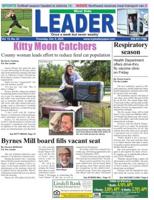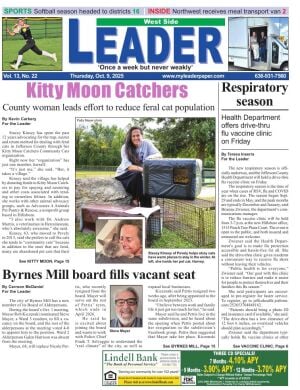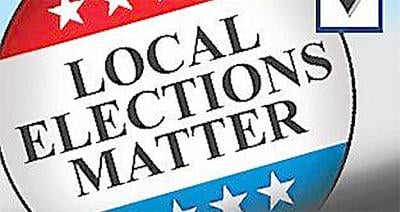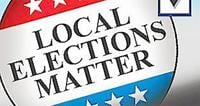Arnold
Proposition P
Byrnes Mill
Crystal City
De Soto
Eureka
Festus
Herculaneum
Pevely
Proposition U
What it is: Enabling the city to collect internet sales tax, also called a use tax, at the same rate it charges sales tax.
Vote needed to pass: Simple majority.
What it will cost: Depends on each resident’s amount of online purchases.
What it’s about: Voters in each city will be asked to approve use taxes, which would allow each of those cities to collect its sales tax for online purchases, as the cities do when people buy goods at brick-and-mortar retailers.
The rates of the use tax will be identical to the sales tax each city collects.
Municipal leaders generally contend that it’s not fair to charge sales taxes at local businesses but not for online sales.
Missouri residents already pay state sales taxes of 4.225 percent on internet sales, but not all vendors collect it. State residents who buy more than $2,000 in untaxed goods and services are supposed to report that on their state income tax returns.
A state law that goes into effect in January 2023 also requires businesses not based in Missouri to pay the state’s sales taxes if they had more than $100,000 in business in the previous calendar year.
The internet sales taxes are commonly called “Wayfair” taxes, referring to a 2018 U.S. Supreme Court case, South Dakota vs. Wayfair Inc., which overturned a rule preventing states from taxing the sales of vendors who don’t have a physical presence in that state.
However, the new law applies only to state sales tax. Counties, cities and other entities that want to collect sales taxes must ask their voters to approve a “use tax” on internet purchases and other out-of-state sales that is equal to their sales tax rates.
If the use tax passes in your city, you will be obligated to pay your city’s sales tax rate if the vendor you’re buying from is based outside of Missouri. If the seller is based in the state, you will be charged the sales tax rate where it is based.
Pevely City Administrator Andy Hixson stressed the point that the use tax has to be paid only if people purchase items over the internet.
“It’s a user tax,” Hixson said. “You don’t have to pay it if you don’t buy online.”
Historically, cities migrated to sales taxes rather than property taxes because they were seen as more equitable – renters also would help finance fire and police protection and street maintenance as would out-of-town shoppers – but also would be more lucrative, if not as predictable as property taxes. However, with more and more people shopping online, cities are looking for ways to ensure that they don’t lose out on their primary source to finance day-to-day operations.
Crystal City Administrator Jason Eisenbeis said allowing cities to collect a use tax is not only fair, it is becoming increasingly necessary.
“You cannot drive halfway across town without seeing some sort of delivery vehicle dropping off packages at someone’s house,” he said. “If we do not diversify the tax base to include internet sales, the sales tax on local businesses will necessarily have to increase in the future to cover expenses, or services will have to be cut. It’s that simple.”
Here's what each city has to say on what it will use the money for:
Arnold: City Administrator Bryan Richison said he does not know how much additional sales tax revenue the city would receive if it’s allowed to collect the use tax.
He said 1 percent of the city’s sales tax revenue goes to fund general operations and the rest funds the Arnold Recreation Center, and any revenue from internet purchases would be divided the same way.
“The city is heavily reliant on sales tax to fund all of our services, from street repair to police protection,” he said. “As more people shop online, we are going to see a decrease in sales tax revenue. We are hoping the voters will approve this use tax to help us capture some of those online sales that are currently not taxed to help us continue to provide the quality services they have come to expect.”
Byrnes Mill:
City Administrator Debbie LaVenture said if the measure is approved, the city could collect about $35,000 a year, enough to hire another police officer.
Mayor Robert Kiczenski said the money could be used for public safety and mental health.
“We feel the proper training and proper people available to assist everyone would be beneficial,” he said.
He said the issue is one of fairness.
“If you’re buying something from Amazon versus Walgreen’s, it balances the playing field for both the entities involved, because right now Walgreen’s is having to pay the local taxes and internet purchases are not,” he said.
Crystal City: City Administrator Jason Eisenbeis said the city’s sales tax rate is 2.25 percent and if it is allowed to charge that on online purchases, it could generate between $300,000 and $400,000, according to estimates from the state Department of Revenue and the Missouri Municipal League.
Ward 2 Councilman Tony Becker said while the City Council has not yet designated what to do with funds generated from a use tax, he proposes using it “to improve roads, sidewalks and alleys.”
De Soto: The city collects a 3 percent sales tax on retail sales, and the use tax would extend that to online purchases.
City Administrator Todd Melkus said officials there have discussed dedicating the money generated by the use tax for road maintenance.
“Currently, we spend $150,000 on annual street repairs. If we could add $40,000 to $50,000 to that, we could do more street repairs. That’s the estimate for what the use tax would bring in (annually).”
Eureka:
City Administrator Craig Sabo estimated the tax would generate about $200,000 in revenue a year.
Mayor Sean Flower said a use tax would level the playing field for local businesses.
“Eureka is an independent, sales tax-driven city, and I just think it’s good in the long term,” he said. “If you’re going to be based on sales tax, you ought to treat sales that are online the same as sales that are purchased in your local stores.”
Festus: City Administrator Greg Camp said money from the use tax, identical to the city’s 3 percent sales tax, would establish a $2 million capital improvement account for several projects at the city’s parks, including a handicap-accessible playground, a splash pad, a playground in the Lambert Hills neighborhood and replacement of the outdated heating and cooling system at the Festus Public Library.
In addition, some of the revenue from the use tax would be set aside each year to hire two full-time employees for the Parks and Recreation Department and a full-time employee for the library.
“After all obligations are met, funds will be set aside each year for library and parks capital improvement and operation in addition to general operations,” Camp said.
If Festus voters approve the use tax in April, the Missouri Department of Revenue projects the city would begin collecting approximately $98,000 per year, Camp said.
Herculaneum: City Administrator Jim Kasten said if the city is allowed to charge its 3.5 percent sales tax on online sales, it would generate between $30,000 and $66,000 a year.
“We (the city’s Board of Aldermen) haven’t designated where it would go, but we talked about capital expenditures, like parks, sidewalks, recreation stuff, playgrounds,” he said.
Pevely: The city collects a 2.65 percent sales tax.
Mayor Stephanie Haas said she believes residents of her city understand that internet sales are on the rise.
“I think we’ve come to the realization this is a society that buys online,” Haas said.
She said sales taxes, which local brick-and-mortar businesses must collect, pay for government services such as police protection and street repair.
“The people at brick-and-mortar stores are keeping our benefits alive,” she said.




